The battle of the non-alcoholic wine alternatives
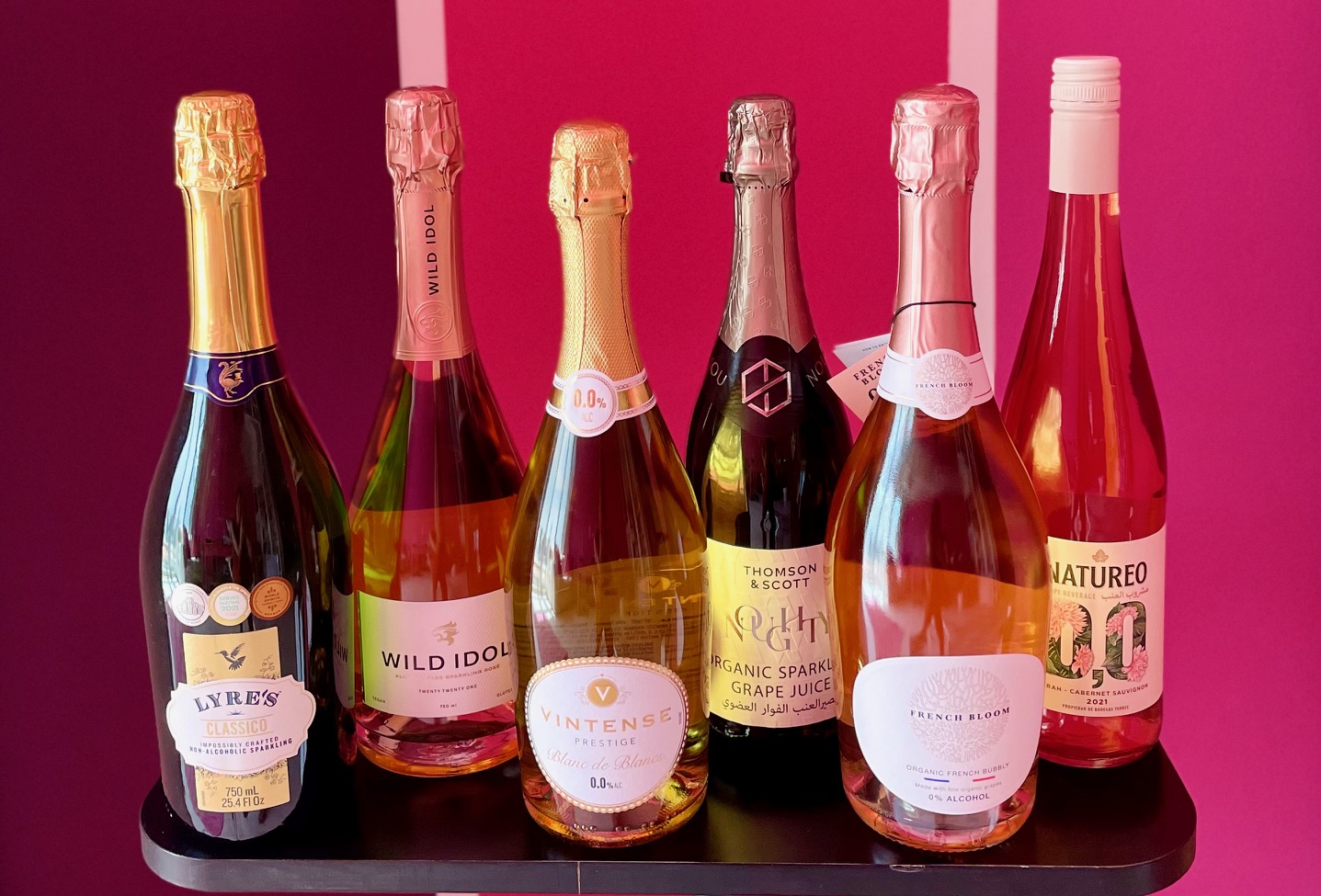
As I press the publish button, I have abstained from alcohol for two months and 17 days, not that am counting. I explained my rationale on Instagram a while back – see further below. I am not sure this decision is permanent, but for now I am relishing the benefits, and, oddly, don’t miss the real deal. I still taste wines for work using a spittoon, like sommeliers – and will continue to host dining experiences where alcohol plays a central role.
This review was shared first with my Substack subscribers, as will all future reviews. Feel free to subscribe HERE, should you wish.
On the back of going public with my journey, not only was I surprised by how many of you are on a similar path – but PRs and companies pitched their non-alcoholic wine alternatives. My initial reaction was to decline, as frankly I am quite happy with water – but then, you might not be. And it is #SoberOctober after all. So I selected one non-alcoholic wine alternative from most brands available in the Dubai market, tasting six bottles in total including my own purchases. Whilst I am WSET 2 wine and spirit certified, I enlisted sommelier-level expertise with my friend Dr Sophia Ledingham, who is WSET 3 qualified with distinction. I first met Sophia when she signed up to my early dine arounds in 2015, and we have since become firm friends.
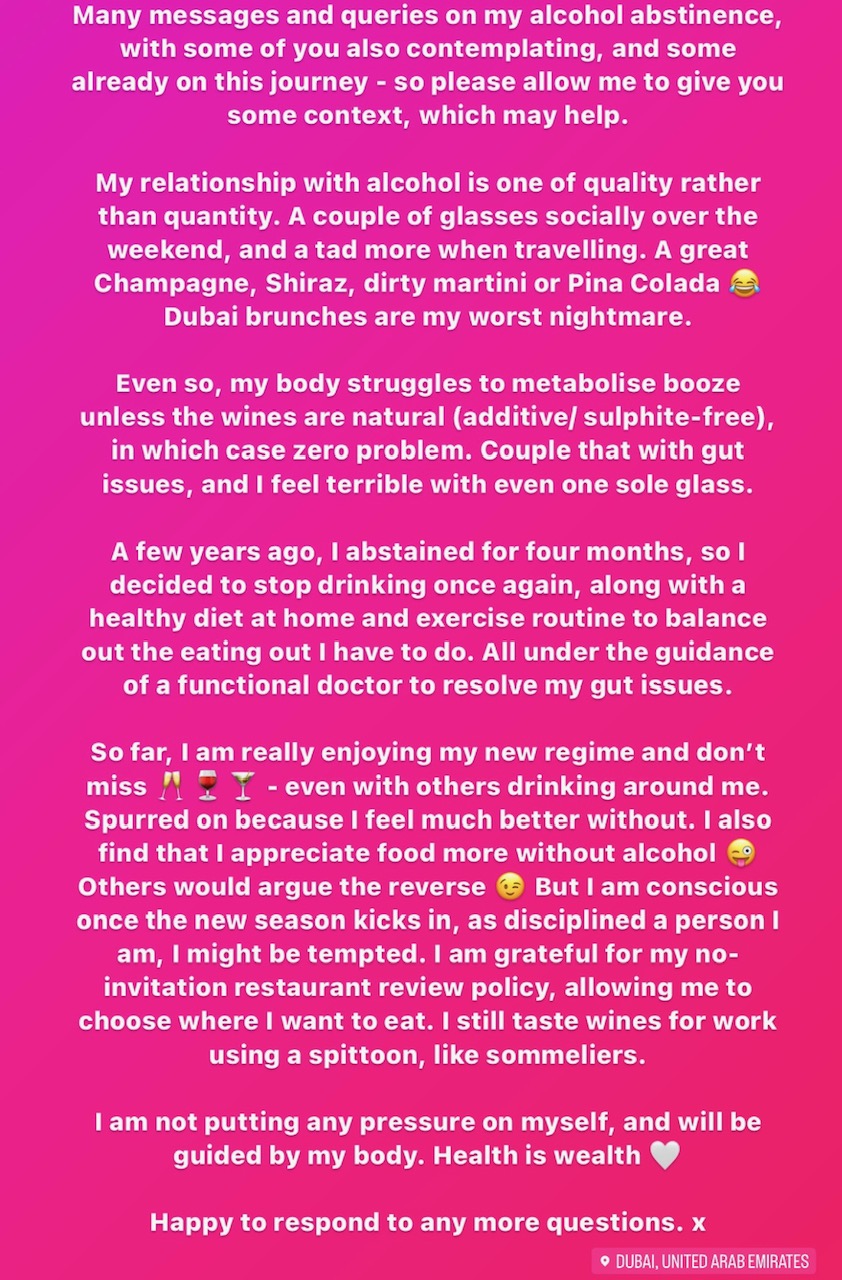
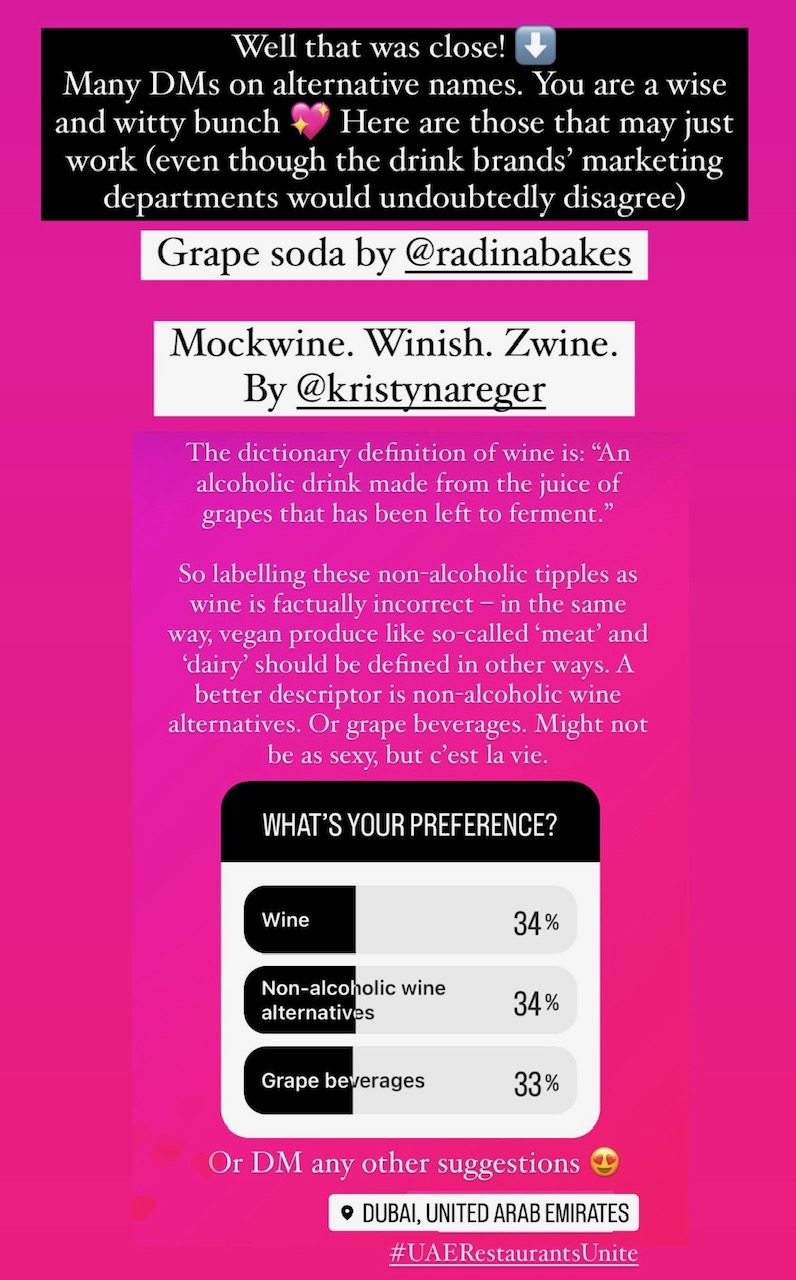
Before we delve into the findings, the dictionary definition of wine is:
“An alcoholic drink made from the juice of grapes that has been left to ferment.”
So labelling these non-alcoholic tipples as wine is factually incorrect, in my book – in the same way, vegan produce like so-called meat and dairy should be defined in other ways. Descriptors like ‘non-alcoholic wine alternatives’, or ‘grape beverages’ might be a better fit, albeit not as sexy. See above for an Instagram poll including wise and witty alternatives from followers. I particularly like the double entendre of ‘winish’.
My objective is to determine whether we can overturn negative perceptions, and find tipples with no after taste and no cloying sweetness – the latter requiring a good level of acidity to cut through. Interestingly, calorie content of these drinks are considerably less than real wine. I have indicated calories for a standard 150ml glass, ranging from 21 to near 38 calories.
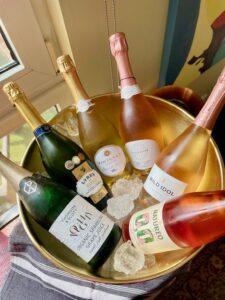
In line with WSET’s systematic approach to wine tasting, we reviewed appearance, nose and palate. And then we weaved in balance, length, intensity and complexity with each metric assigned a score of faulty, poor, acceptable, good, very good or outstanding. All whilst making allowances for the fact that these tipples will never match the real deal.
We found three that we would happily recommend drinking – and, personally, I might buy these for home consumption every now and again. I am shocked at the sky high price of non-alcoholic beverages on restaurant wine lists, in some cases even pricier than the real stuff, so unlikely I will order any when dining out. A few restaurants even sneak in the non-alcoholic tipples with the wines on their lists, in the hope that the high pricing won’t stand out as much. Ludicrous.
Five out of six are de-alcoholised wines which initially follow the same process as conventional wine, however all the alcohol is removed after fermentation, either through reverse osmosis or spinning cone technology, at low temperatures and under vacuum. All are precisely 0.0% alcohol. Interesting UK article HERE on why making booze-free wine is challenging.
Over an at-home tasting, here are our findings:
TOP THREE:
Thomson & Scott, Noughty, Organic Sparkling Grape Juice
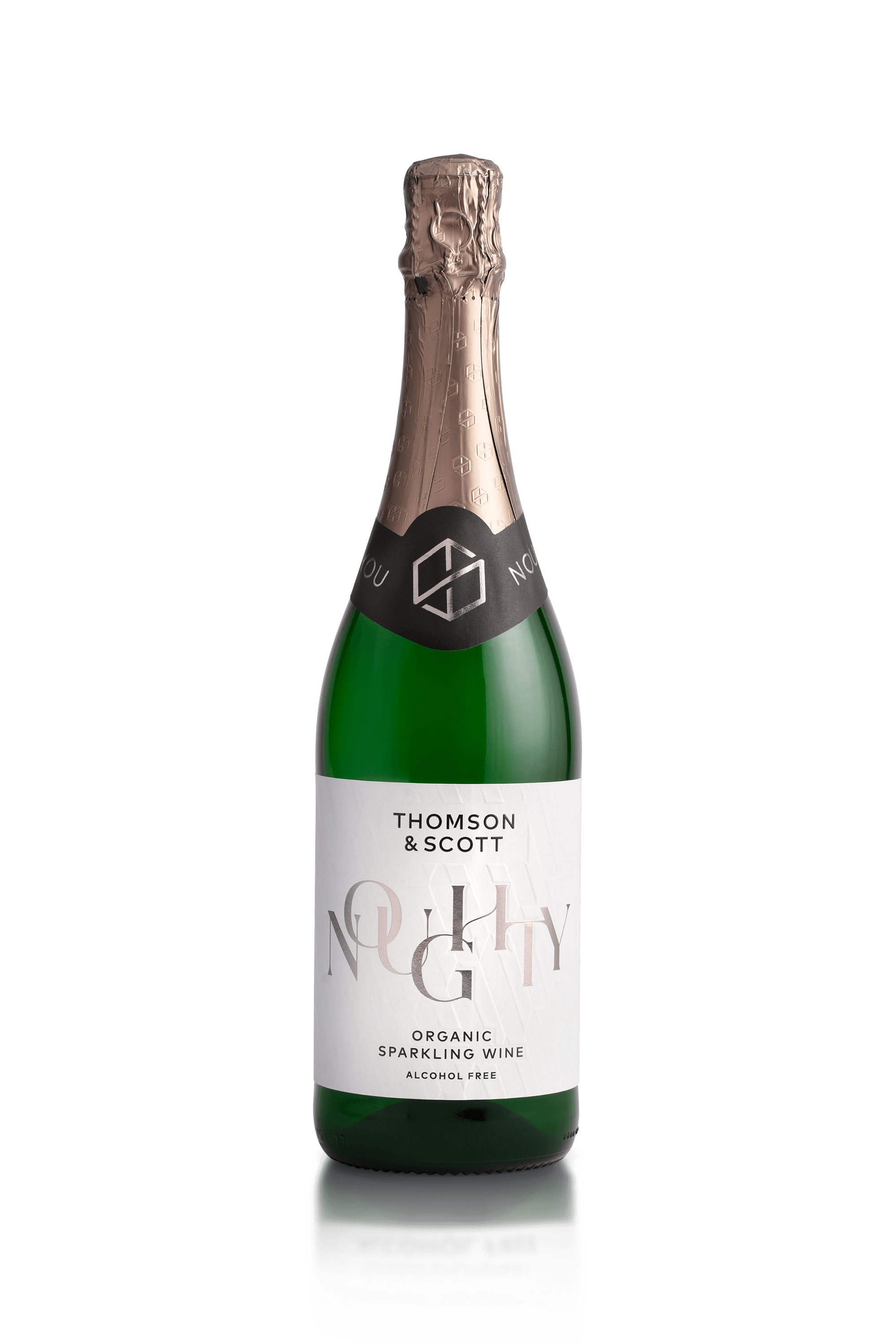
- Outside the Arab world, this label is branded ‘Dealcoholised Sparkling Chardonnay’ or ‘Organic Sparkling Wine’ in place of ‘Organic Sparkling Grape Juice’, as it is here.
- A traditional winemaking method in stainless steel vats – followed by de-alcoholisation with vacuum distillation and aroma recovery, and then lightly carbonated.
- Made in Germany, with the grapes grown in sandy, calcareous vineyards in southern Spain.
- Alcohol-free organic Chardonnay grapes, with organic sugar, carbon dioxide, sulphur dioxide preservative. Less than 150mg per litre of sulphites.
- Gluten-free, as well as organic, vegan and halal certified.
- 2.9g of residual sugar per 100ml. 21 calories per 150ml.
- Powerful fermented yeast scent upon opening the bottle, in line with real wines. A welcoming effervescent head and bold bubbles. Pale lemon colour. Sourdough and yellow apples on the nose. Honeysuckle on the palate. Crisp taste. Balance, length and intensity score very good, with good complexity.
- I bought this bottle from Spinneys in store for AED139.50. Also available at Choithrams for AED132.75 and online through Drink Dry for AED105.
French Bloom, Le Rosé, Organic French Bubbly
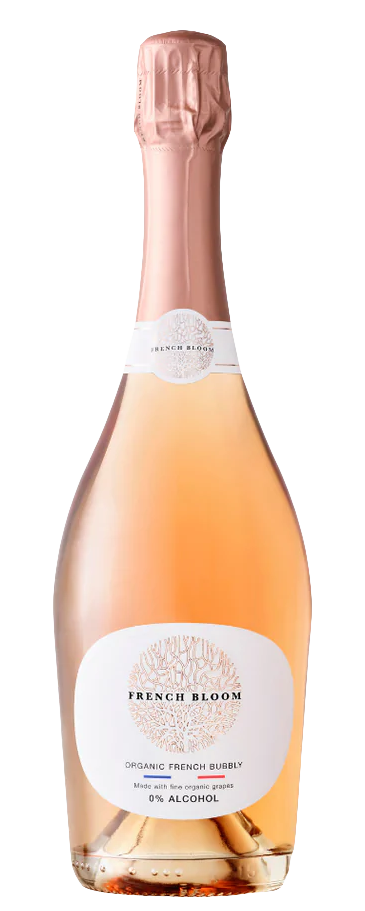
- A blend of de-alcoholised organic French Chardonnay and Pinot Noir wine with organic grape juice, Gensac spring water and natural organic flavours such as lemon.
- The co-founder Maggie Frerejean-Taittinger is ex-Michelin, married into the Taittinger family, with her husband as the winemaker, and an ex-Krug head on the team. You couldn’t ask for better credentials.
- Sulphite and preservative free. Organic, vegan and halal certified.
- No added sugar. 28.5 calories per 150ml.
- Salmon rose colour, like Billecart-Salmon 😉 Plump bubbles. Prune and dark fruits on the nose that become less prominent on the palate, thankfully, with good acidity and peach notes. Very good scores for balance, length and complexity, with good intensity.
- AED190 at Galleries Lafayette in Dubai Mall or online on Drink Dry.
Vintense, Prestige, Blanc de Blancs
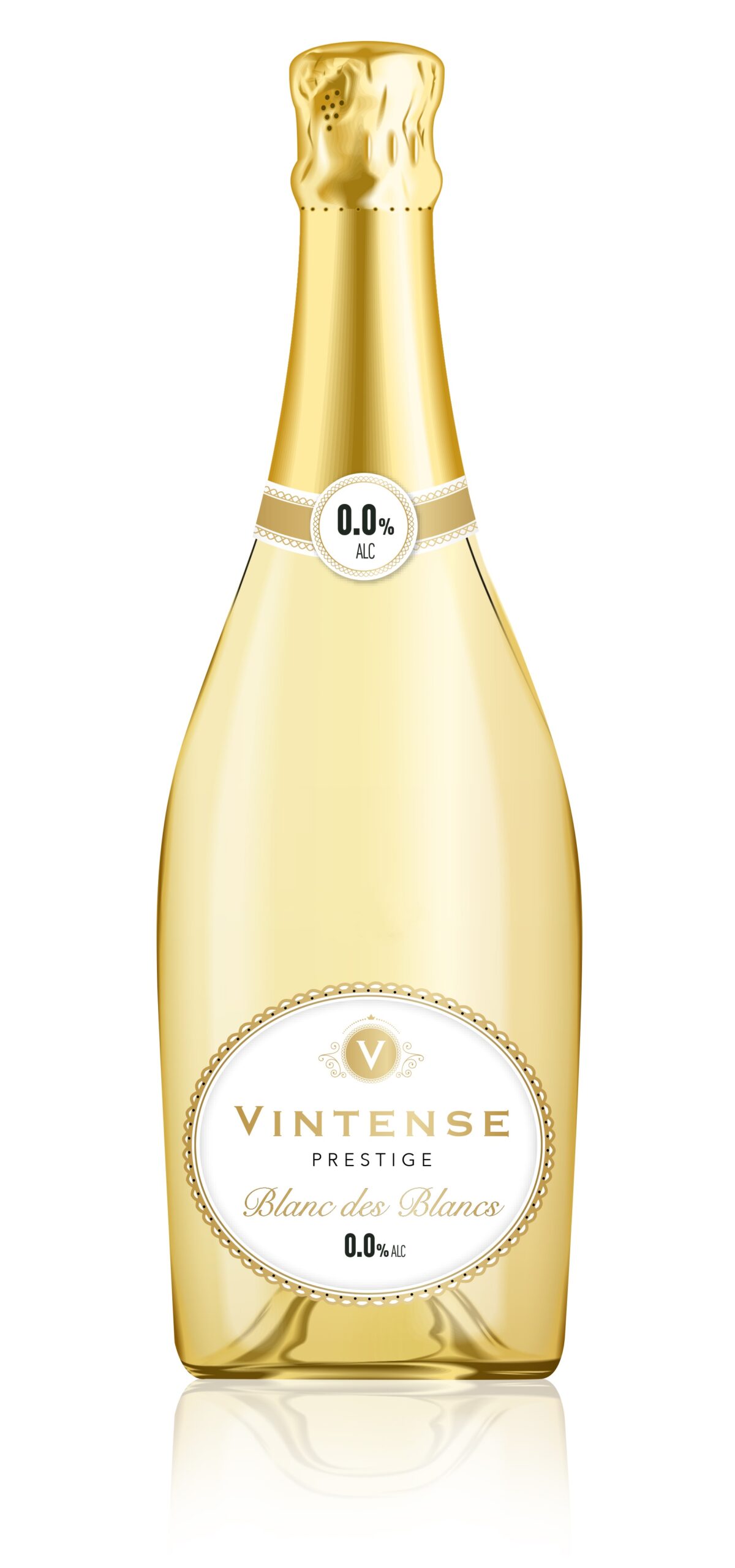
- A Belgian sparkling beverage 100% de-alcoholised at low temperature under vacuum.
- Non-alcoholic Chardonnay grapes, grape must concentrate, carbon dioxide, natural flavours, ascorbic acid, sulphites.
- Low dosage, i.e. minimal residual sugar is added. 21 calories for 150ml.
- Golden colour. Less mousse on the head than the above two, however bubbles are pronounced. Brioche and honey on the nose, moving to apple sauce and honeysuckle on the palate. Scoring acceptable across all metrics – balance, length, intensity and complexity.
- AED68 online from Drink Dry and Amazon.
THE THREE ADDITIONAL TIPPLES WE TASTED
Wild Idol, Alcohol-Free Sparkling Rosé, 2021
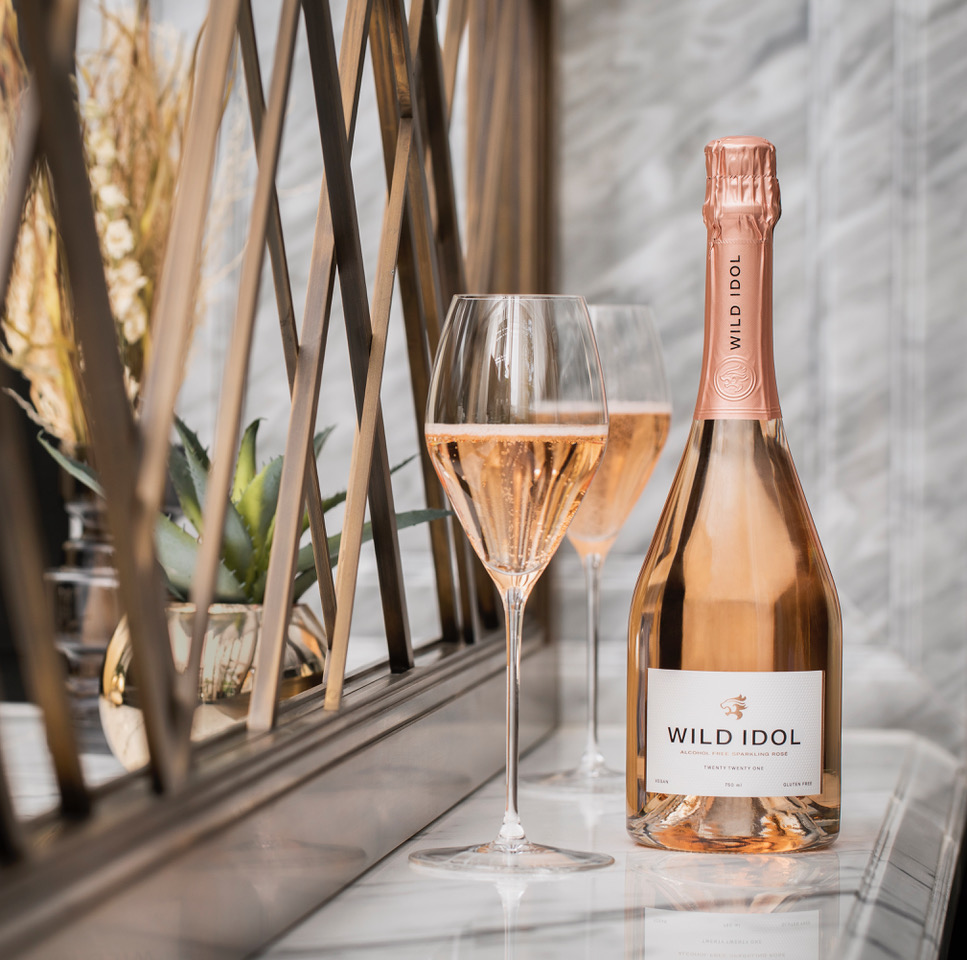
- The only non-alcoholic wine alternative we tasted that has never contained alcohol and has never gone through fermentation. So if you’re super strict about not consuming alcohol, then this is the tipple for you.
- German Müller-Thurgau and Merlot grapes are harvested and pressed in the same manner as in winemaking. The natural juice is then chilled for up to 12 months, ensuring the juice does not ferment – and then carbonated.
- Produced at Balfour Winery in Kent (UK), led by ex-MD of Lanson Champagne, Paul Beavis.
- Water, grape juice (33%), fruit vinegar, rectified concentrated grape must, carbon dioxide, citric acid, anthocyanin (natural food additive), potassium sorbate (salt additive).
- No ‘added’ sulphites, however a tiny amount of naturally occurring sulphites derived from the grapes are present.
- Vegan, gluten-free and halal certified.
- No added sugar. 37.5 calories per 150ml.
- Pale rose colour. Some effervescence. Raisins, prunes and fruit cake on the nose, which are intensified on the palate bringing a cloying sweetness. It’s worth noting that more raisin-like aromas are cropping up at the moment, due to global warming, with grapes shrivelling before harvest. So perhaps these grapes were harvested from hotter areas. Low acidity. Balance and complexity score poor, with good intensity and length.
- I was intrigued to see if its sibling, the sparkling white fared better – which it did. With solely Müller-Thurgau grapes, it was crisper with bold green apple notes. With no Merlot grapes, the cloying raisin-like sweetness was absent – however it still lacked acidity and complexity.
- AED175 at MMI stores and online.
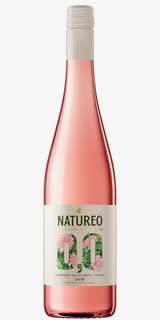
Natureo, Grape Beverage, Syrah & Cabernet Sauvignon, Bodegas Torres, 2021
- The sole still ‘wine’ we tasted – a rosé. 100% de-alcoholised Syrah and Cab Sav grapes using a spinning cone column machine to extract the alcohol.
- Produced by the world-famous Familia Torres winery in Spain.
- Preservatives: E-242, and sulphur dioxide. Contains sulphites.
- 28.5 calories per 150ml.
- Raspberry meets copper colour. Cherries on the nose which become more prominent on the palate. The balance scores acceptable, however the length, intensity and complexity are poor.
- AED35 online on Drink Dry.
Lyre’s, Classico, Impossibly Crafted Non-Alcoholic Sparkling
- Produced in the UK with Italian grape concentrate that is fermented using tank carbonation (like Prosecco), and then de-alcoholised to 0.0%. The bottle and branding also mimic Prosecco.
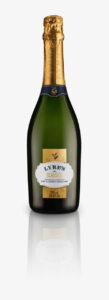
- Carbonated water, sugar, non-alcoholic fermented grape juice concentrate, grape juice concentrate, acidity regulator [citric acid, sodium citrate], natural flavouring, preservative [sodium benzoate].
- Free of dairy, nuts, eggs, gluten and sulphites. Vegan.
- 3.9g of sugar per 100ml. 37.5 calories per 150ml.
- Very pale to near clear colour, which reflect the brand’s marketing towards the Prosecco drinker. Off-putting artificial, bubblegum-like notes on the nose. Singular and cloying green apple-meets-elderflower notes on the palate. The intensity scores acceptable, however balance, length and complexity are poor.
- Lyre’s is renowned more for non-alcoholic spirits, so I expect this tipple is best used as a cocktail mixer.
- AED57 from MMI stores and online, or AED110 from Amazon.
Have you come across any other non-alcoholic wine alternatives that you would recommend?
A bientôt
FooDiva. x
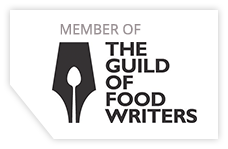













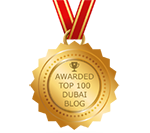
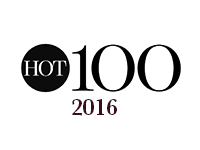
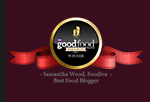
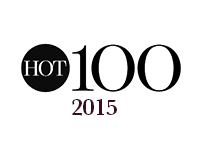


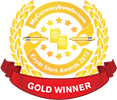




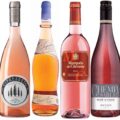
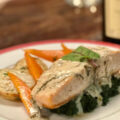
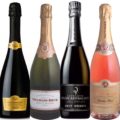
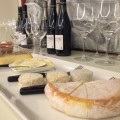
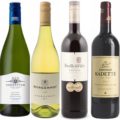


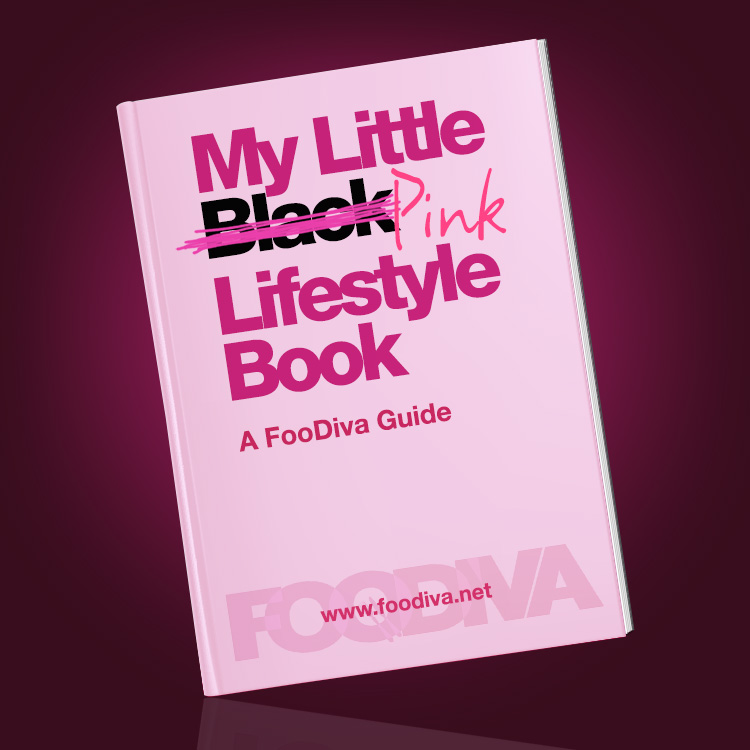
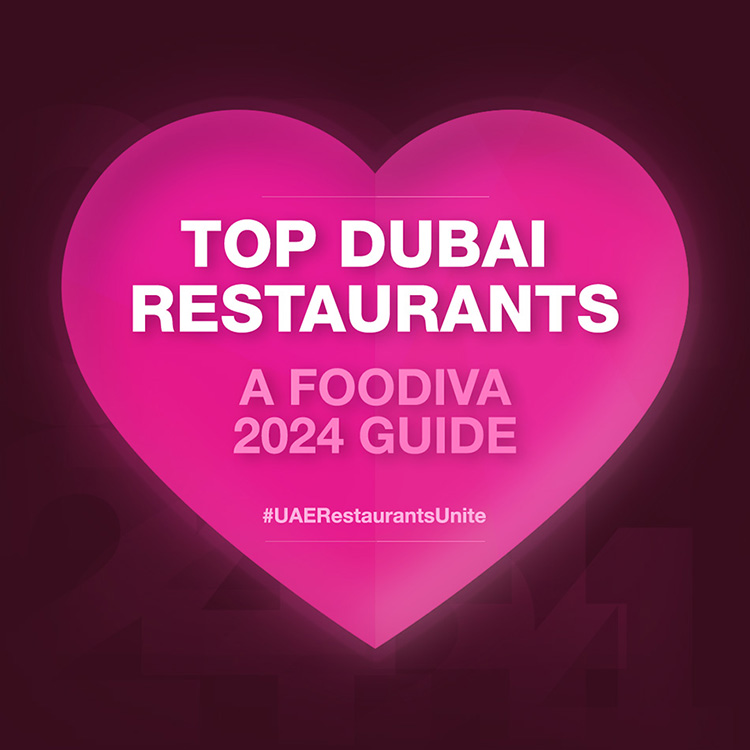



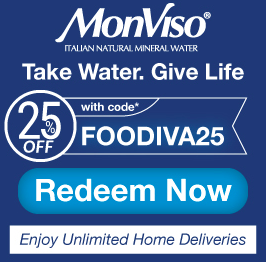

No comments yet